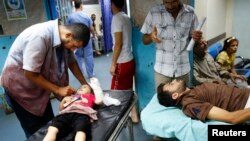U.S. President Barack Obama say he has told Prime Minister Benjamin Netanyahu that "no nation should accept rockets being fired into its borders," as Israeli troops backed by tanks, aircraft and navy ships continued to advance into the Gaza Strip.
Speaking at the White House Friday, the president told reporters he made clear during a phone conversation with Netanyahu that the understanding is that the ground operation will destroy tunnels that Hamas militants are using to attack Israel.
"We are hopeful that Israel will continue to approach this process in a way that minimizes civilian casualties and that all of us are working hard to return to the ceasefire that was reach in November of 2012," said President Obama.
Palestinian medics say at least 25 Gaza residents have died since the start of the ground offensive. In total, more than 265 Palestinians have died since July 8, when Israel expanded its airstrikes in Gaza in what it said was an attempt to stop rocket fire into Israel.
The United Nations says about four out of five of those killed have been civilians, including dozens of children. Two Israelis have died.
The Israeli army reported its first fatality early Friday when a soldier was killed during clashes with fighters from Hamas, the Islamist group that controls the Gaza Strip.
The United Nations Security Council will hold an emergency meeting on the crisis in Gaza later Friday.
Overnight, the Israeli army said via Twitter that it killed 14 militants, destroyed 20 rocket launchers, carried out nine strikes on tunnels and hit a total of 103 "terror targets."
Israeli Prime Minister Netanyahu said Friday he was prepared to "significantly widen" the offensive, which until now appears to be more limited than Israel's 2008 and 2009 operation when about 1,400 Palestinians and 13 Israelis were killed.
Yonah Jeremy Bob, a legal affairs correspondent at The Jerusalem Post, tells VOA the invasion seems to be restricted to strikes by special forces in urban neighborhoods. He says most Israeli troops are either massed in open spaces on the edge of Gaza or are starting to surround urban areas.
"The Israeli government is hoping that with this initial operation and by destroying a lot of the tunnels in open areas, destroying more targets in some of the urban settings, that if they bloody Hamas' nose up enough, they'll be willing to settle for cease fire terms closer to what Israel wants," said Bob.
Hamas in recent days has proposed a multi-year truce that includes demands such as the lifting of the long-standing Israeli blockade on the Gaza Strip, opening air, sea and land entries into Gaza, and the release of Palestinian prisoners arrested by Israel last month in the West Bank.
Israel has instead been pushing for an Egyptian-brokered cease-fire that calls for a "cessation of hostilities" in exchange for an increased movement of people and goods between Gaza and Israel. Hamas has rejected the plan, saying the offer amounts to a surrender.
Chris Gunness, a spokesman for the United Nations Relief and Works Agency for Palestine Refugees, tells VOA that the fighting has made conditions intolerable for the 1.8 million Palestinians who live in the impoverished Gaza Strip.
"The humanitarian plight of civilians in Gaza was desperate and has become absolutely catastrophic. Before the fighting, over 90 percent of the water was undrinkable, millions of liters of raw sewage flowed into the sea every day. Those dependant on UNRWA for food was well over 800,000. Then the war happened. 22,000 people have been displaced," aid Gunness.
Mohammed Suliman is a 24-year-old Gaza City resident. He says that the airstrikes and shelling in his neighborhood are increasing. Early Friday, he said Israeli missiles struck an apartment building next door to his home at least five different times, killing a woman. He he says he had witnessed no militant activity in the area.
"I really feel like I could lose my life at any moment if I go outside. I've never been scared for my life like this. I really know that if I go out, it could be me being killed. There have been numerous cases of people who are killed merely for being outside of their home," said Suliman.




